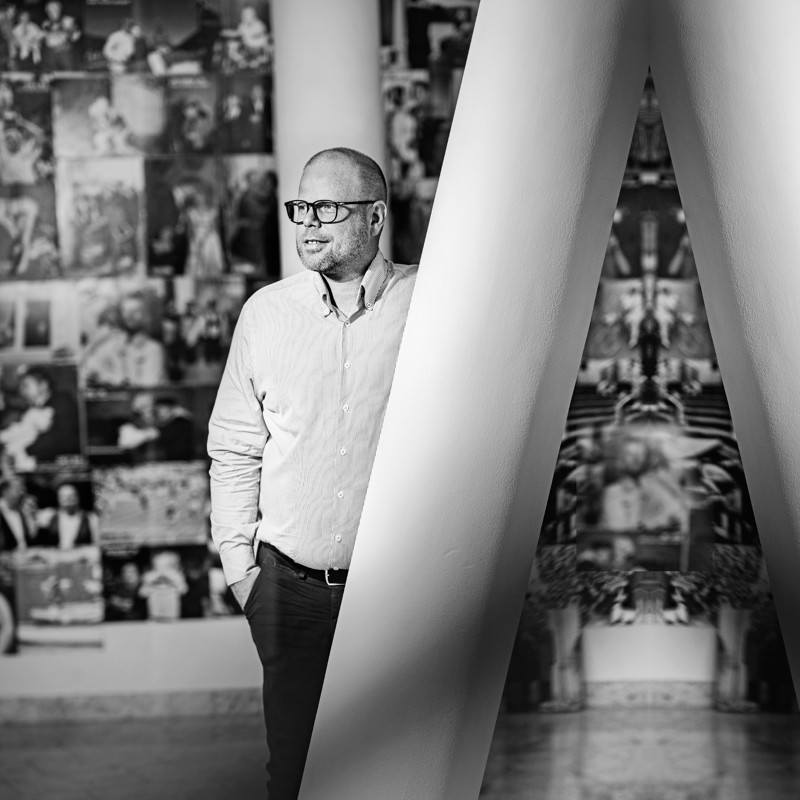Why stick to a rigid budget process in a world where the business landscape is constantly changing? Martin Tørnes, CFO of Aller Media, dreams of leaving behind a company that is not constrained by inflexible budget frameworks, but instead navigates based on real-time data and KPIs. In this interview, you can read how this specifically manifests itself, and how technology and systems play a role in the process.
A confrontation with budgets
From the moment we settle into the sofa in Aller's foyer, where the interview is to take place, it's clear that Martin Tørnes has a vision he wants to bring to life. He is currently challenging the classic budget process, which he believes provides a sense of security and control but doesn't always benefit the business.
"One of my dreams is to leave behind a business without budgets," he says. "The effort that goes into budget planning – not just in Finance, but throughout the business – is extremely time-consuming."
And according to Martin, the time consumption is made even worse by the fact that no business is so static that a budget would be accurate for the entire period it's meant to cover.
"Last year, it was almost impossible to meet our budget from 1 October when we started the fiscal year. And we had just spent three to four months estimating where we would end up," he says. "So, I have a desire to minimize that effort, partly by moving to a more KPI-driven model, where we use realised figures as a starting point for looking into the future."
Because owners and shareholders will, probably, always have a need to see which financial expectations the business has of the year. But how can one meet that need without spending all the business's time on something that will be incorrect in a couple of months anyway?
At Aller Media, they do it, among other things, by decentralising many of the decisions in the budget process.
"For us, part of the solution is to give employees and managers a greater mandate. For example, we give our head of marketing a percentage of the turnover that he can use as he wishes, as long as it's within the limits we've set. That way, it's not a detailed budget dictating how he should spend the money or whether the department can, for example, afford to hire a new employee," Martin says, adding that ongoing follow-up is crucial in this regard.
"And that follow-up and close-to-the-number transparency must come from Finance," he specifies. "They must contribute to managers getting insight into their numbers continuously so that they can make the right decisions."
But it's also a process that takes time, he emphasises. "It's both a cultural change and a management task that changes. Because you have to dare to let go."
A cycle dictating overspending
Classic budgets also have another problem that Martin wants to address. "The budget contributes to dictating a kind of cycle in how we operate, but in reality, there isn't such a big difference between 30 September, when our old accounting year ends, and 1 October, when the new one begins," he explains.
"I've often seen consumption at the end of an accounting year and thought: but why?" he smiles, then becomes serious. "If you've given a figure in a budget, then the company will typically spend all the money on that budget line. And it would be better if the business operates on the basis that we have a going concern that also continues the day after the last balance day in an accounting year."
But a budget also provides some key figures that the rest of the business needs to know. "Of course, our printing house needs to know how much to print, but it's important that we don't let ourselves be blinded by what's in the budget. It's no use letting the budget dictate how large a circulation we should print without following up on sales week by week. Because all the magazines we don't sell, we have to pick up in the stores ourselves and dispose of."

Martin Tørnes took up the position as CFO of Aller Media A/S in 2021 and is responsible for Finance and Acquisitions – and since 2023 also for People & Culture. Aller Media A/S consists of four companies and has a total of about 400 employees.
Technology and systems in the budget process
Before Martin started working for Aller Media, he was in a company that used a flexible approach to budgets and forecasts, and here the right systems and tools helped ensure that the process worked. "We actually reached a point where making a rolling budget was quite simple, partly because we had a system that supported us. And now we've acquired the same system at Aller, so that we can move into a more KPI-driven management and budgeting model," Martin tells us, adding that the other countries in the Aller group have also begun to request systems to support their estimate processes.
But for Martin, it's important that both the choice and implementation of new systems are employee-driven:
"It was important to me that my team bought in from the beginning. They shouldn't feel that I was forcing a particular system down their throats – the system was to be theirs. So, they've been presented with different systems and their possibilities. And then they actually drove the entire implementation."
But before the implementation phase, Aller Media's Finance department spent a lot of time ensuring that they didn't just create a one-to-one copy in the new system of the solution they already had.
"We have, among other things, had an external consultant on the task with insight into the system and its possibilities, who has challenged us on what we needed and how our processes should look. And because he comes from outside the company, he has been able to give us insight about the functioning of other processes, so that we can make better decisions," Martin explains.
Consultants with new knowledge
In general, Martin is very conscious of the way he uses consultants and external advice.
"Consultants come with fresh eyes and experience from other companies – and that's needed when you have been working in the same company for several years. So, it's important to acknowledge that and to listen to what they say," he says.
"The longer we have the consultants, the more value we can get from them, and the more actively we can use them when we, for example, consider whether to do some things differently than what we've done before," Martin says, but also adds that his possibility of benefitting from consultants depends on the specific situation. "If, for example, we have a consultant because we’ve had a critical notice of termination at the end of an accounting year, focus has been on solving the most important tasks," he says.
Because it's not fun to deal with what Martin poetically calls a burning platform. He has tried that before. Most recently a year ago, when Aller Media lost their entire HR department, which Martin had to rebuild – among other things, with help from an interim HR manager and an HR consultant. You can read more about that in the article “Aller’s digitalisation of HR processes creates more time for the business”.
But what has happened since then? "We've established a full team," Martin smiles. "Now we're starting to get system support and review some of our HR processes, including our performance talks. Initially, it will be a partly manual process, but over time it should ideally become completely integrated into our HR and data system."
The future is automations and AI
Whether in Finance, HR, or the editorial offices, it's clear that systems and technology take up much of Martin’s time.
"We talk a lot about how AI and machine learning can help and support us in the business," he says. "The more help we can get from systems and from new technologies, the less time we need to spend on repetitive processes and manual tasks that take so much time, for example in connection with month-end closing. And the more time we can instead spend on creating value in the process with analysis, etc."
One of the specific initiatives that Aller Media's Finance department is working on in the field of AI is incorporating recognition and posting suggestions in their supplier system. "We're teaching the system to recognise patterns and, for example, make an automatic provision if an invoice for one of our fixed expenses isn’t received one month. If a post has landed in a specific place the last three months, the system should also assume that it should land there again," he explains.
The editorial offices also have much focus on AI. But here the reception is mixed.
"The journalists make up a professional group that has been significantly pressured for many years, so for them AI is probably not the most fun. Therefore, I believe it's important to involve them all the way – they should also see the value it can create for their work," says Martin.
"The media houses have cut so deeply into the journalist staff that journalists only have time to produce exactly what is required for them to publish what they need to. And that means that journalists don't have time to go out and create more investigative substantive content, which we know consumers also want. Because that's the direction it's going," Martin says and elaborates: "Especially on the slightly more in-depth weekly magazines, we would like to go deeper into the material. And we may be able to afford to do that if AI helps create the basic articles, so that our journalists have time to create something more value-creating."
Martin sits quietly for a moment, looking thoughtful, before concluding: "AI is here to stay, and it concerns all functions. And we must be among those who figured out how to succeed."

Would you like to know more?
Would you also like to challenge your company's budget processes? Or do you need sparring about the best way in which to get systems and technology support your work?
Please contact me for a non-binding talk.

 en
en
 da
da

